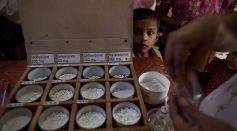Tags: Malaria
Venom From Cone Snails May Potentially Treat Malaria

Malaria Now Bites Harder in Africa Due to Drug-Resistant Strain

Malaria Fight Stagnant as WHO Identifies Funding and COVID-19 as Obstacles
Research finds Children in Uganda Passing Malaria to Mosquitos
EMBL Researchers Create the First Models of Parasitic Gliding Functions

Malaria Update: Rwanda Finds Artemisinin Resistant Parasites
Genetically Engineered Male Mosquitos to be Released in Florida and Other Parts of US to Curb Zika and Dengue Spread

Are Malaria Drugs the Solutions to the Worsening COVID-19 Pandemic?

Deforestation Can Lead to Wider Malaria Transmissions, Says Scientists

Anopheles Mosquitoes Are More Resistant to Insecticides Thanks to Proteins Found in Their Legs
Drug-Resistant Malaria Cases Increase in Asia
Fungus Modified With Spider Venom Offers New Hope in Fight Against Malaria
Spider Toxin - Injected Fungi Increases the Rate of Killing Malaria Carrying Mosquitoes, Says Study
Genetically-Modified Fungus May Stop the Spread of Malaria
Folded wax paper: a fast method in detecting malaria
'Monkey Malaria' Is Threatening Male Farmer in Sabah, Malaysia
Malaria Infection Could Cause Chronic Bone Loss, Scientists Found Out
Trump Does Not Want American Taxes To Pay For Abortion As US President Expands Funding Ban For Overseas Aid
Africa Found Way To Eliminate Malaria; WHO Launched New Vaccine Against Life-Threatening Disease
Insecticides Can't Stop Mosquitoes To Bite, Reproduce, Spread Malaria
Most Popular

The Strongest Tornadoes Ever Recorded: Scientific Breakdown of Extreme Tornado Events

How Space Affects the Human Body: Key Health Challenges Impacting the Astronauts

Can Scientists Predict Earthquakes? The Latest Advances in Seismic Forecasting Explained

Photosynthesis Made Easy: Light Reactions, Calvin Cycle, and Everyday Examples





